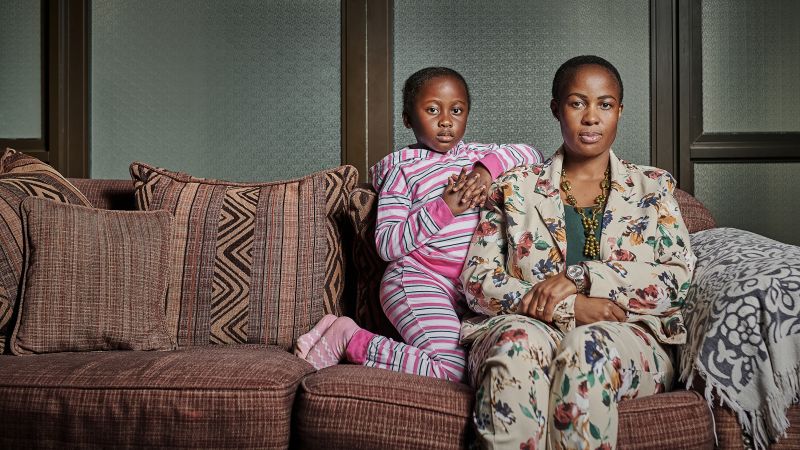CNN
—
Theto Ngobeni was just 18 days old when doctors first inserted a shunt into the back of her head to drain excess fluid accumulating in her brain.
She was born with a condition known as hydrocephalus, which doctors said was caused by a listeriosis infection that her mother contracted while pregnant.
Now seven, Theto has already had six operations to replace her shunt due to infections and blockages. Hospital bills have depleted the family of five’s medical insurance cover, forcing them to sell their house to cover mounting debts.
“We are still owing the hospital a lot of money, we are still owing the bank a lot of money,” said Theto’s mother, Montlha, who herself had to have a double hip replacement at 37 because of the listeriosis infection. “It’s very difficult and we are on our own. No one is helping us.”
Listeriosis is a foodborne disease caused by listeria bacteria. It can lead to serious illness in high-risk groups, including the elderly, infants and pregnant women. Pregnant women can transmit the infection to their unborn babies, potentially leading to lifelong health problems with the brain, kidneys or heart.
Montlha is one of more than 1,000 people infected in South Africa between January 2017 and mid-2018 in what the World Health Organization declared the world’s largest ever listeriosis outbreak. Recorded deaths totaled at least 216, including 93 newborns under a month old and nine children age 14 and under, according to South Africa’s Department of Health.
Others affected were, like Theto, infants in utero, left with serious health complications, including cerebral palsy and other neurological difficulties.
In March 2018, South African health officials linked the outbreak to ready-to-eat meats, mainly polony, produced at an Enterprise Foods facility then owned by Tiger Brands, the country’s biggest food producer.
The contaminated products had likely been manufactured and sold for more than a year by that point, based on a timeline of the outbreak given by South Africa’s health department.
Following the health department’s findings, the company temporarily closed the factory, located in the city of Polokwane north of Johannesburg, as well as two other sites in Germiston and Pretoria. It also recalled its ready-to-eat meat products, pledging to address any “valid claims which may be made against it in due course.”

Almost seven years on, a class action lawsuit brought against it on behalf of Montlha and more than 1,000 other plaintiffs has yet to be resolved, despite evidence gathered by local health officials tying the outbreak to the Enterprise Foods plant and products.
Based on that evidence, the lawsuit claims that the plaintiffs “contracted listeriosis and suffered harm” after eating contaminated products produced by Tiger Brands, allegations the company denies in legal filings.
Tiger Brands maintains that “liability has not yet been determined.”
“While the legal process has proved long and arduous, we reiterate our commitment to ensure a resolution of the listeriosis class action lawsuit is reached in the shortest possible time, in the interest of all parties, particularly the victims of listeriosis,” the company told CNN.
According to Thami Malusi, a senior associate at Richard Spoor Incorporated Attorneys (RSI), the law firm representing the plaintiffs, the case could finally go to trial this year. He told CNN that settlement discussions were “progressing well,” but noted that RSI was continuing to prepare for trial.
Last year, the United States experienced its own deadly listeria outbreak linked to deli meats produced by Boar’s Head, a well-known delicatessen brand that sells ready-to-eat meats and cheeses in supermarkets throughout the country.
Ten people died and 61 were sickened after eating the contaminated products, according to the US Centers for Disease Control and Prevention (CDC). Federal health officials declared the outbreak over in November, but the company is now facing multiple lawsuits connected to the outbreak.
In a letter to customers in September, Boar’s Head apologized for the listeria contamination of its liverwurst product and said it was taking “comprehensive measures… to prevent such an incident from ever happening again.”
Bill Marler, co-founder of US food safety law firm Marler Clark, is representing around two dozen individuals in cases against the company. A leading foodborne illness attorney, he has also consulted with RSI on the Tiger Brands case.
“It’s likely that my clients in the US will have justice prior to the folks in South Africa seeing a penny as it relates to compensation,” he told CNN.
Marler suggests that if the South African listeriosis outbreak had happened in the US, the company responsible would likely be made to pay between $1 billion and 2 billion in damages. By comparison, Tiger Brands, if found responsible for the outbreak by a judge, may be on the hook for just 2 billion rand ($106 million), according to initial estimates by lawyers bringing the class action suit.
“It was really clear in 2018 that the cause of this outbreak was the Tiger Brands plant and it was the polony,” Marler alleged.
“Nothing has changed, other than that there’s been six years, almost seven, where the victims of this have been left with nothing. I think that is a travesty.”
The case made by RSI relies heavily on specialized genetic testing done by South Africa’s CDC equivalent, the National Institute for Communicable Diseases (NICD). Known as whole genome sequencing, it matched the same strain of listeria found in the Enterprise Foods Polokwane plant and products to the strain found in the majority of people who were sickened.
Dr. Juno Thomas, the head of the NICD’s Centre for Enteric Diseases, likened the testing to “DNA fingerprinting” that allowed the institute to compare the bacteria from patients, contaminated food and the factory “and ascertain with a great deal of precision whether they match exactly.”
The common presence of the so-called “outbreak strain” amounted to “conclusive evidence of the source of the outbreak,” she told reporters in March 2018. The NICD did not identify that same strain at any other meat processing facilities in South Africa.
In a statement the following month, Tiger Brands acknowledged that its own tests had also found that same strain of listeria in a sample of ready-to-eat meat products from the Enterprise Foods facility in Polokwane.
The company told CNN this month that the NICD’s refusal to share “all the data in its possession… has significantly hampered a speedier resolution” of the case.
Malusi, of RSI, disputes that, saying the results of the NICD’s whole genome sequencing tests have long been made available to Tiger Brands and amount to “all the necessary evidence” to connect the company to the outbreak.
“Tiger Brands could have long settled this case if they wanted to,” Malusi told CNN. Only in the last few months has the company sought to provide some financial relief to victims with urgent medical needs, but for the most part it has been “obstructive and uncooperative,” he said.
The NICD declined an interview with CNN, but in a statement in April 2018 linking the outbreak to the Enterprise Foods facility, it said: “It is extremely misleading for anyone to claim that the primary cause of this listeriosis outbreak is unknown.”
Tiger Brands must ‘take accountability’
As the legal process rumbles on, Montlha says she is desperate for Tiger Brands to “do the right thing.”
“Our innocent kids are struggling for something they did not eat. (Tiger Brands) owes us an apology and then compensation,” she added.
Nthabiseng Ramanamane shares that sentiment. Ramanamane, who is another of the claimants in the class action seeking compensation from Tiger Brands, contracted listeriosis while pregnant, allegedly after eating polony manufactured by the company.
Her son, Onkarabile, was born more than two months premature with cerebral palsy.

“I’d like to ask Tiger Brands to take accountability and show remorse to the people who are affected by their negligence,” she told CNN.
Now seven, he is unable to perform even the most basic functions, such as feeding himself, sitting up unassisted or turning himself over at night. He requires adult diapers and a special diet. Like Theto, he has endured several operations in his short life.
“I was a frequent buyer of (Tiger Brands) products. I loved the cold meats and I regarded them as safe,” Ramanamane said. “Little did I know that it’s going to cost my entire life and it’s going to literally steal the life of my son.”
